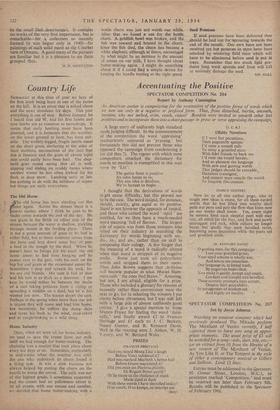What noise is that ? How now, what hath befallen
?
I'll tell the news; here comes the general. Tomorrow—out of joint—the pity of it— Ripeness is all.
Do you get the way I've twisted the meanings there ? I'd like to see Mr. Anthony Hartley having the cheek to teach, not only Doctor Sitwell and that Donne man, but me and the late William Shakespeare how to write.
Nothing could be more dangerous for us all than a disastrous split between USA and Britain. And therefore it becomes very important for you to lead the way in your country to a revival of Anglo:American unity on the basis of an uncompromising fight against Communism. If you were to do that, and if it became clear in this country that Britain was going to go clearly in that way, and not in the way of the Bevanites, then you may be sure that the tendency back to isolationism in this country would be halted. The attitude. of the French is also important, for you as well as for us; but we, and I hope you also, should not be guided in our position and action, by the confusion and impotency which we see in France.—Yours faithfully, ROBERT A. HECICERT
522 Locust Avenue, Philadelphia 44, Pa. CRITIC BETWEEN THE LINES Sat,—Mr. Hartley complains of illogicality in some lines by Dr. Sitwell. Her reply, delivered with tremendous scorn, is, " that's not me—it's Donne." But what has that to do with it ? Either the lines are illogical or they are not. To drive the point home Dr. Sitwell adds that " more than one great poet " has used " fragments from the past" in his work. Again, what has that to do with it ?
Dr. Sitwell finds Mr. Hartley not only " impertinent " (the attitude to criticism revealed here is an interesting one) but also rather ill-read because he fails to recognise, at sight, a scrap of Donne's prose tinkered out of its context. But there are other ways of being unscholarly, and by far the most serious is the persistent refusal to give precise references. Apparently these lines are not merely quoted, but adapted' and given a twist,' in which case it is no wonder that Mr. Hartley did not recognise them. In such cases the reader has an absolute right to be directed to the original passage—otherwise how can he appreciate the poet's artistry 7 By a most unfortunate accident,' which ' nobody regrets more than' Dr. Sitwell, this information was not given when it ought to have been given. A letter to the Press a propos this very point might seem to many a favourable opportunity to make good this deficiency. But Dr. Sitwell has persisted in saving herself trouble.
Is English literary controversy ever to be
Personally I think the sap of a tree is more like Double Diamond than peridots and beryls but if Doctor Sitwell likes to say it's like peridots and beryls then that's quite okay by me. It just shows how we great poets differ.—Yours faithfully, LITTLE MR. TOMKINS [Name and address supplied].
Sta,—It seems to me that in his article "Critio Between the Lines," Mr. Anthony Hartley said some very important things about the state of English poetry today. He dared to lay down principles and this is something. one can only admire at a time when so much criticism refuses to go beyond the particular poem or the merely personal reaction of the critic. Mr. Hartley writes within a wider chntext. It is good to find someone who can declare boldly, " The poet must keep his eye on the object, he must create his images, he must believe in them, feel them and touch them himself, he must organise them within the framework of an ordered universe which he himself has made from language."
So much that goes by the name of poetry today is either, on the one hand, an intel- lectual game remote from feeling, or, on the other, a mere outlet for uninteresting, uncon- trolled emotion. As Mr. Hartley says, " Only an organised contact with human reality can give back to our poetry the essential guts it so badly needs." Poetry must become involved again with life. It is the poet's job not only to see further and feel further than others, but to construct a language, a music and a world of images that are tough enough to deal with anything that takes place in the contemporary world and the human mind.


















































 Previous page
Previous page